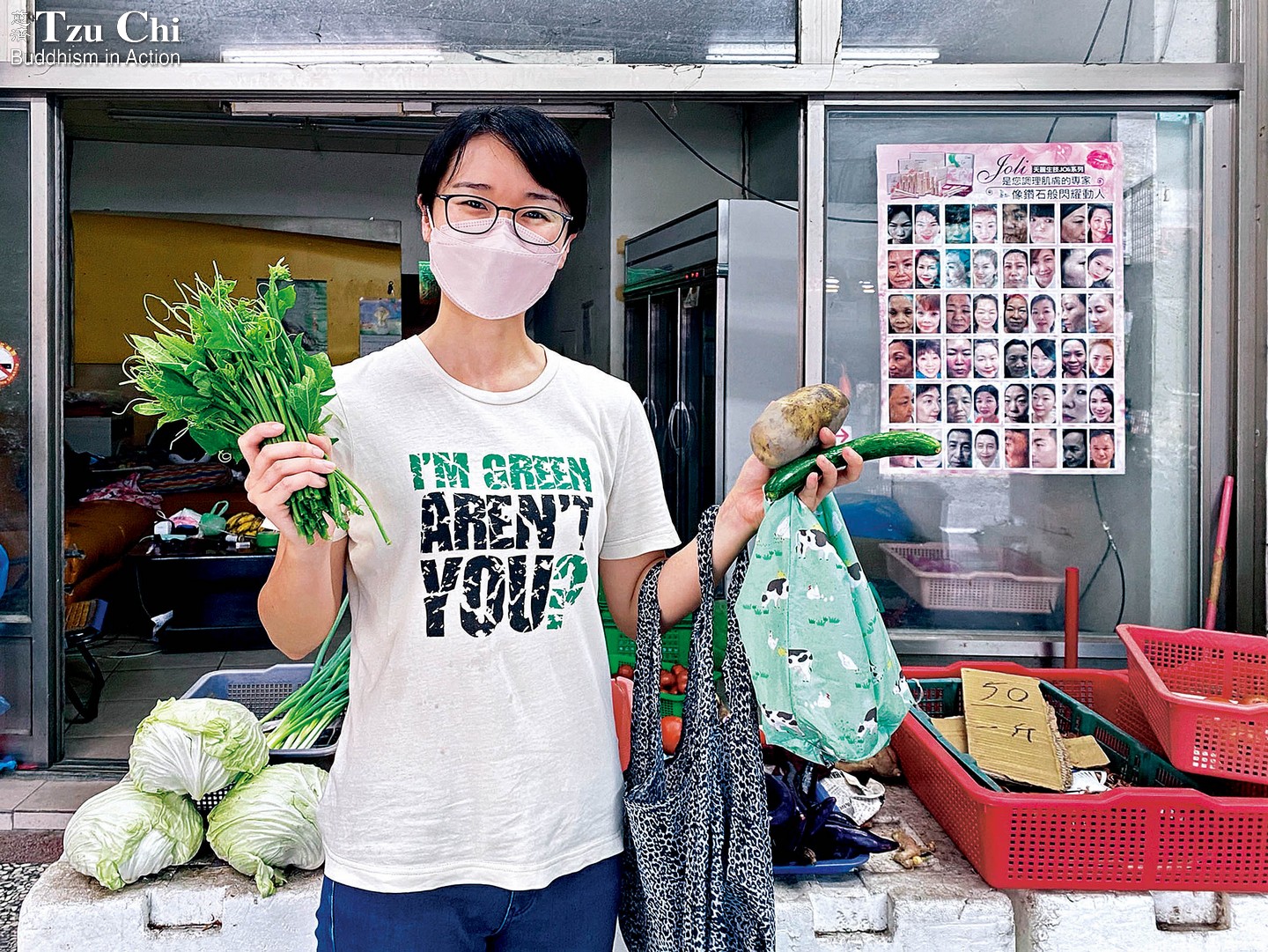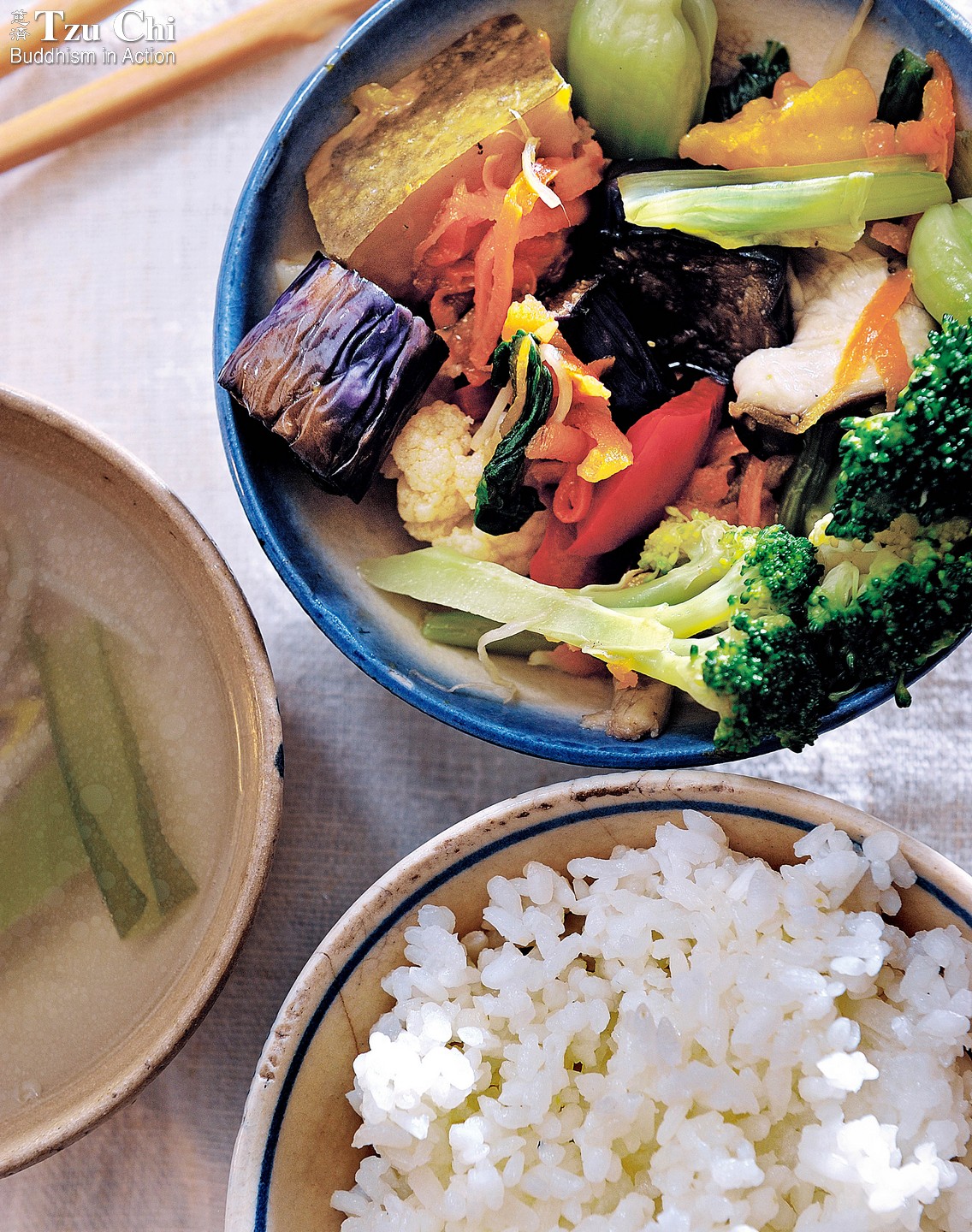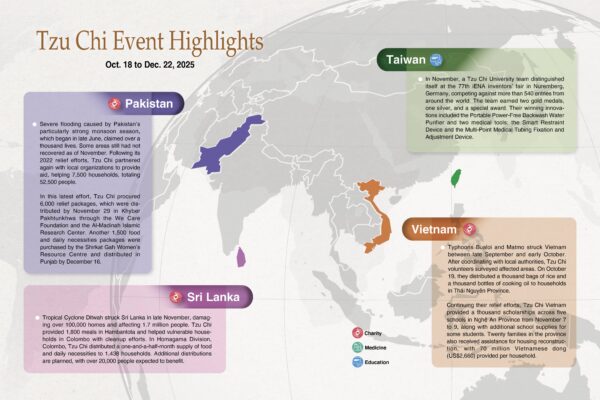By Yeh Tzu-hao
Translated by Wu Hsiao-ting
People in our generation are already confronting the problems of extreme weather conditions and insufficient resources. If we don’t cherish our Earth now and take action to protect it, what kind of future will upcoming generations have?—Wu Pei-shan

The T-shirt Wu Pei-shan is wearing is ten years old. She carries containers and reusable shopping bags when she goes grocery shopping. She produces little garbage because of the green life she leads. Li Pei-yun
“Tickle, tickle…” Wu Pei-shan (吳佩珊) is having fun with her nephews, one ten months old and the other over two years. The two youngsters are giggling with glee under their aunt’s tickling fingers.
Wu loves her siblings’ children as if they were her own. She babysits them when she goes home on weekends or vacations so that her sister and brother can have a breather, and she strives in her daily life and at work to help ensure that we are leaving behind a better planet for them.
“People in our generation are already confronting the problems of extreme weather conditions and insufficient resources,” she said. “We have only one Earth. If we don’t cherish it now, what kind of future will upcoming generations have?”
Wu is young, in her early 30s, and a member of a Tzu Chi team that promotes vegetarianism. She has urged other adults more than once to think of future generations and lead a greener life by eating vegetarian, conserving energy, and taking other actions to reduce their carbon footprint. Though she now lives and works in Taiwan, she began her commitment to environmentalism much farther south, in the Land Down Under.
From Australia to Taiwan
When she was younger, Wu left Taiwan for Sydney, Australia, to pursue her college education. She majored in hotel management. It was there that she met Tzu Chi volunteers and became a member of the Tzu Chi Collegiate Association. Since Australia is among the drier countries in the world, the authorities there emphasize the importance of conserving water. Wu joined older Tzu Chi volunteers in Sydney in becoming the city government’s water conservation ambassadors, and they’d visit Chinese schools to share with teachers and students how to save water. In the process, Wu herself learned a lot about water conservation.
“We often heard the government in Australia appeal to people not to wash their cars during water shortages,” Wu said. “In our home, we developed a habit of putting a bucket in our bathroom to catch our shower water; then we’d use that water to flush the toilet. I’ve kept the habit to this day.”
After she graduated, Wu stayed and worked in Australia. She continued to lead an eco-friendly lifestyle. The city in which she and her sister lived could get as cold as 1 or 2C (33.8-35.6F) in the winter, and hotter than 30C (86F) in the summer, but they didn’t use air-conditioning or heating—they just tried to adjust to the temperature. “Since I could commute to work by train or bus, I didn’t have to drive,” Wu said. “When we went grocery shopping, we used reusable shopping bags. And we reused plastic bags until they were torn.”
Wu returned to Taiwan in 2015, and she started working at Tzu Chi headquarters in Hualien, eastern Taiwan, in early 2016. She had become a vegetarian when she was in college, and she wanted to inspire more people to switch to vegetarianism to help cut emissions and protect life. She began promoting the earth-friendly diet after work via eating shows on social media. Her work in Tzu Chi now is to help the foundation promote vegetarianism via projects and activities such as the 21-day whole-plant diet program started by Tzu Chi volunteers in Malaysia. (For more about this diet, please read the November 2021 issue of our magazine.) Though her large workload keeps her very busy, she never allows herself to become lax in practicing environmentalism in her daily life.
When food in her refrigerator is running low, she bikes or walks to a traditional market to buy package-free food ingredients. She asks vendors not to bag her purchases and instead just puts all her food items in a reusable shopping bag she carries. She even removes the rubber bands used to keep vegetables bound together and returns them to the vendors. Because of these practices, she produces almost no packaging waste when she cooks. She also does not use any disposable tableware. “If I need to eat out or buy ready-made food, I make sure I take my reusable cup, bowl, and chopsticks.”

Eating vegetarian is good for the environment. Wu, a vegetarian herself, helps Tzu Chi promote vegetarianism. Chen Hong-dai
Small inconveniences, big impact
In order to reduce waste, Wu even switched to cloth sanitary pads, the kind that can be washed and reused. Though using cloth menstrual pads instead of the disposable kind means that she has to take the trouble to wash and sun- or air-dry them, she doesn’t mind the extra work. “I’m just doing what women used to do—before the invention of single-use sanitary pads,” she said.
She even persuaded her brother to use cloth diapers for his son. She didn’t need to persuade her sister to do so because her sister knew early on the benefits of cloth diapers, that they are more breathable and eco-friendly. But it took her some work to convince her brother to do the same. She even bought cloth diapers for him so he could use them on his newborn son.
Based on the experience of her two nephews, parents need to prepare 35 to 40 cloth diapers for one child to use because the diapers need to be washed. The numbers seem high, but if disposable diapers are used, a baby will need to go through more than 5,000 before they grow out of the need for them.
Wu observed that though it takes time to wash cloth diapers, as well as water and electricity, they are still more environmentally friendly than the one-use kind. “Besides, they trap less heat and are better for the baby’s skin,” she added.
In addition to urging those closer to her in age to “go greener,” Wu has done the same with her parents, who run a guesthouse. Wu suggested that they stop providing single-use toothpaste tubes, toothbrushes, razors, and other similar items to their guests. It wasn’t easy to get the seniors to accept the new idea though.
“My dad used to run a five-star hotel in Taipei,” Wu explained, “so he puts a premium on service quality. He believed that it was a must to provide those items to our guests.” Wu’s university major was hotel management, so it was easy for her to understand her father’s insistence on serving their guests’ needs the best they could. However, she believed that given the global attention to climate change and the general consensus to reduce emissions, people will accept a new way of doing things in the name of the environment.
When staying at others’ guesthouses during their family trips, Wu would seize the opportunity to advise her parents to learn from those guesthouses’ environmental approaches, such as opting for natural, organic shampoo or body wash, reducing the use of plastics, and using motion sensor lights to save energy. By and by, her parents came around and began running their guesthouse in a more environmentally friendly way.
“We stopped providing single-use items five years ago,” said Wu’s mother, Li Mei-yu (李美育). “When people make reservations with us, we tell them they’ll need to bring their own toiletry items because ours is an eco-friendly guesthouse.” Due to their daughter’s influence and the environmental information they have been exposed to, Li and her husband have come to realize the importance of doing what they can for the Earth. “I believe everyone resonates with efforts made for the planet,” Li continued. “We’ll continue doing our part to help.”
Wu makes a good case for what she urges people to do for the good of the planet. She’s even more convincing because she walks her talk. Her commitment to the Earth and the actions she takes to protect it are not just for the benefit of her beloved nephews, but for all the children in the world.

 Zoom in picture)
Zoom in picture)

